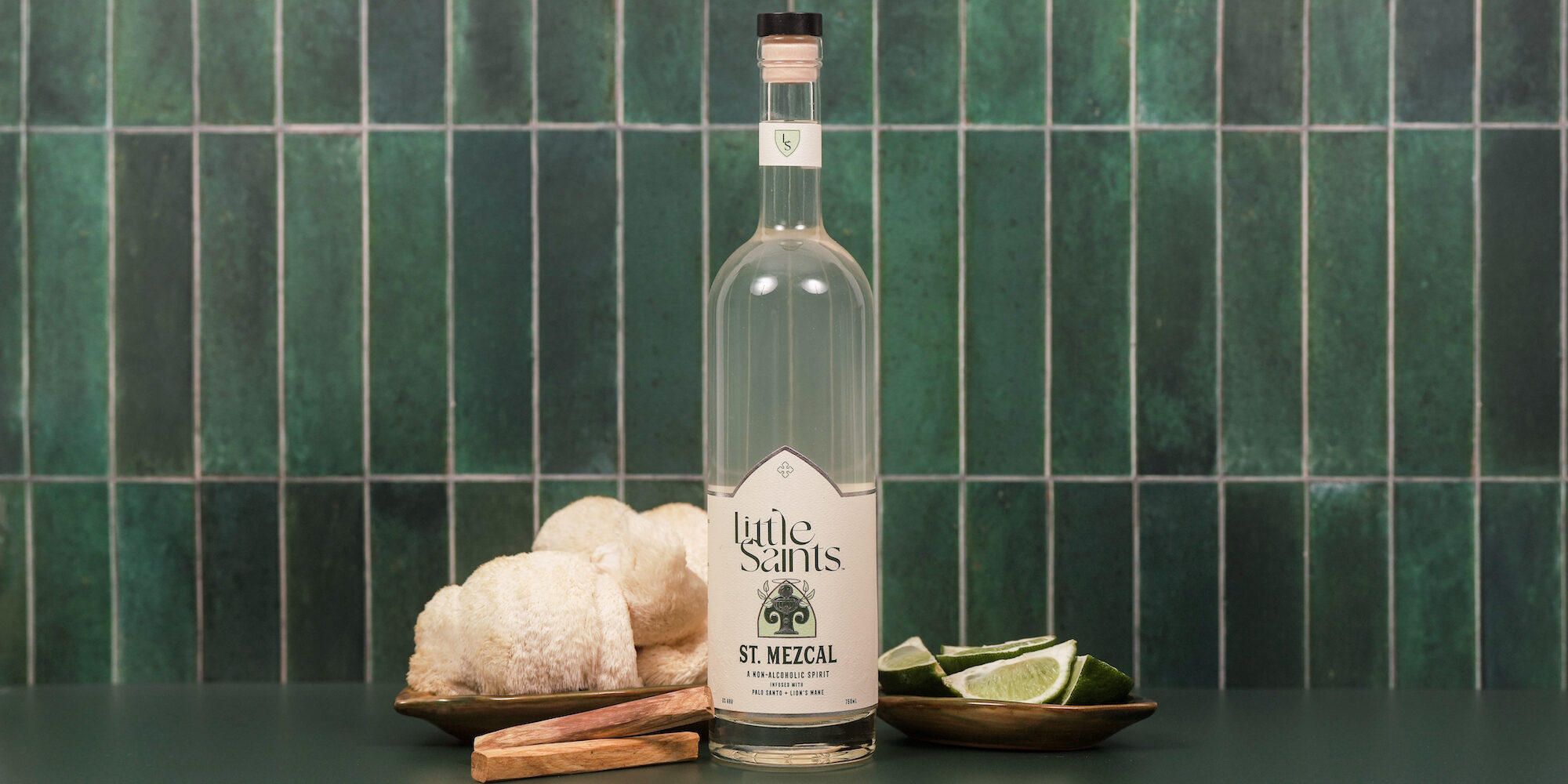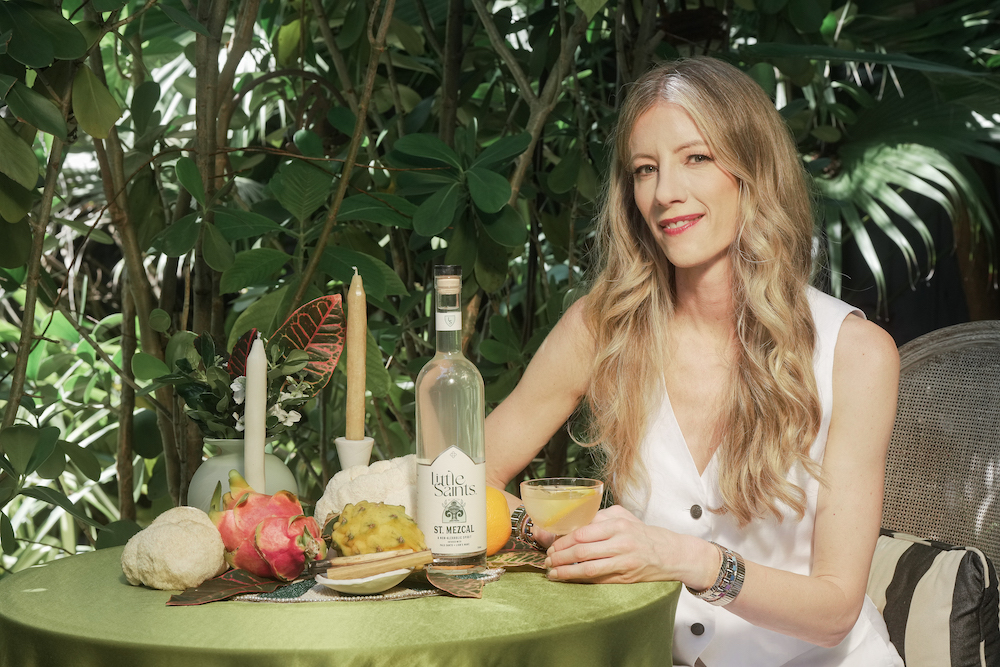
Little Saints Creates Lion’s Mane-Packed Non-Alcoholic Spirit St. Mezcal
“The future of imbibing is plant medicine and non-alcoholic drinks,” declares Megan Klein, a former lawyer and founder of CBD and adaptogen mocktail specialist Little Saints.
After launching in 2021 with a range of canned non-alcoholic drinks, the brand named for mushrooms or niños santos as they’re referred to in Spanish in South America has introduced mushroom-packed St. Mezcal, which breaks Little Saints out of the can with a 26-oz. glass bottle priced at $49.99. The beverage is infused with 100 milligrams of lion’s mane mushroom per serving.
“It’s the first non-alcoholic drink to have what I would call a functional dose of a mushroom in it,” says Klein. “We put lion’s mane because it works. We wanted you to feel it.”

It took Klein over a year to pin down the recipe for St. Mezcal that’s inspired by mezcal’s distinct flavor, sans alcohol. In contrast, the serial entrepreneur formulated the brand’s original mocktails and got them out to market in four months. For St. Mezcal, she aimed to achieve a layered smell and flavor profile characteristic of traditional mezcal.
Klein says, “I wanted that really rich experience that you have with premium spirits, and I wanted that to be palo santo because it’s smokey and woody, and it’s also in the mint and fennel family.”
During the development process, with every iteration of St. Mezcal Little Saints tested, it conducted five rounds of tastings. The drink is designed to have a flavor profile blending wood, fennel, ginger, cardamom and vanilla with mezcal’s signature heat and peppery finish.
“It was a real process of paying homage to mezcals, tequilas and wines that take a really long time and a lot of love to get them made,” says Klein. “It’s the next level of alcohol adjacency. We are not making this for people that don’t want anything to do with alcohol. There’s very strong alcohol associations. This is definitely for people that have enjoyed cocktails in the past and they want a similar experience.”
Sustainably sourcing and making a food-grade palo santo extract for St. Mezcal wasn’t easy. Klein located a palo santo source in Mangamanguilla, a community in Peru with a conservation area where residents harvest dead and fallen trees to produce palo santo sticks and oil that are sent to the United States. Little Saints had to secure a U.S. Department of Agriculture timber permit to import palo santo from its Peruvian supplier.
“The future of imbibing is plant medicine and non-alcoholic drinks.”
“We know that the money is going back to that community,” says Klein, who prior to Little Saints founded plant-based food company Field + Farmer and was president of vertical farm operation FarmedHere. “That was really important for me personally with my background in sustainable farming to be able to tell the story of not only an ingredient, but of the community that produces it. That’s one thing that I see missing in the non-alcoholic space. We love to know about the vineyard a wine comes from. We really want to bring that history into this.”
Initially, Little Saints’ American manufacturing partner wasn’t thrilled with using raw palo santo oil from Peru in a U.S. beverage. Following a year of persuasion, though, it agreed to help realize Klein’s vision. She says, “I had to convince them that it’s safe to ingest. It’s been the most marketing and education I’ve ever done on the front end of a product.”
Klein started Little Saints in the thick of the pandemic, venturing to music festivals around Michigan to promote it and selling its cans of sugar-free, cannabis-infused mocktails Paloma and Ginger Mule for $7 each out of a trailer hitched to her mint green Jeep. The business was bringing in about $5,000 a month before it even had an e-commerce platform. That platform went live on Oct. 1, 2021, and Erewhon promptly picked up the brand.
Its sales have generally grown steadily since, but received a big boost thanks to feature on NPR’s Marketplace morning report late last year. At the time, Klein divulges Little Saints was generating about $11,000 in sales on a two-week basis. When she woke up at 7:15 a.m. on the day of the Marketplace feature, the brand had already pulled in $11,000 in sales for the day. Recently, the brand’s sales have increased 222% quarter-over-quarter, and they’re on track to jump more than 500% this year.
Klein raised $20 million at Field + Farmer, but she’s taking a comparatively measured approach to Little Saints’ growth, both for growth and funding. It doesn’t have institutional capital—at least not yet. Klein self-funded the company for its first year, and then raised between $1.5 million and $2 million from friends and family members last year.





Leave a Reply
You must be logged in to post a comment.